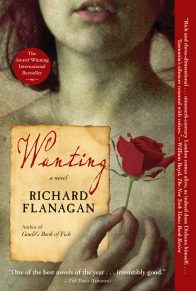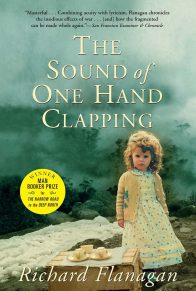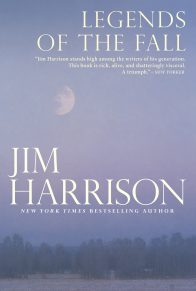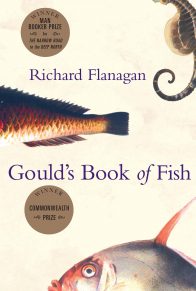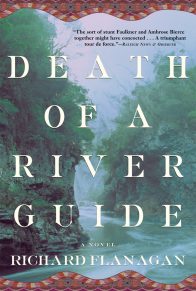“Anyone can do grandeur, but it takes a special literary skill to make squalor grand . . . [Flanagan] aspires to transmute the dangerous lunacy of today into art . . . Brilliantly Flanaganian at moments . . . Here is the vitally vicious Flanagan who can stop a reader’s breath.” —Melvin Jules Bukiet, Los Angeles Times
“Captivating . . . [Flanagan] offers a spot-on montage of the variously sharp, broken, venal, hopeful and predatory folk who populate the nether regions of a modern waterfront . . . A masterpiece in craft and structure. Convincing as both thriller and tragedy . . . Like all great stories it transports the reader to a particular place in time and space . . . Mr. Flanagan’s prose is gritty as the outback, naked as a crocodile, and as clear as every postcard photo of Sydney Harbor’s iconic Opera House . . . Thrilling in its helices of luxury and squalor and loyalty and lust, kinetic in its serial events that swell like a tsunami, provocative, in its counterpoint of privacy, security and politics, inspired in its portrait of Gina, The Unknown Terrorist is a cautionary tale well worth reading—if you like your fiction raw.” —Philip Kopper, Washington Times
“In this stunning and brilliant and roaring book he shouts the question loudly to be heard in every nation ranged against brooding Bin Laden and his teams of killers: Is our own paranoia dragging us down faster than the coward in the cave could ever dream? Are we so afraid of terrorists that we will terrify the innocent among us? Are we building vast fortresses in which to imprison ourselves?” —Brian Doyle, The Oregonian
“A suspense thriller with a heart of bitter satire.” —Jerome Weeks, San Francisco Chronicle
“Mightily plausible, and terribly sad. A writer who knows his characters and setting creates a compelling, timely work.” —Kirkus Reviews
“Unapologetically Australian. . . . A primer on the paranoia that is sweeping the world.” —Richard Whittaker, The Austin Chronicle
“Australia’s sun-kissed streets become as sweaty and oppressive as the Algerian beach in Camus’ The Stranger.” —Gilbert Cruz, Entertainment Weekly
“[The Unknown Terrorist] whips paranoia and a critique of the media into a live-wire thriller.” —Time Out New York
“Sharp prose . . . Vivid writing.” —Clea Simon, The Boston Phoenix
“Dazzling use of language is still on display.” —Nick Owchar, Los Angeles Times
“A bleak look a the post-9/11 world. . . . Flanagan skillfully traces her journey over the next five days.” —Vikram Johri, St. Petersburg Times
“Fast-paced, blunt, angry, terrifying and smart.” —Fredric Koeppel, The Commercial Appeal
“A terrific novel, maintained at fever heat but never straying beyond the bounds of possible or even the likely.” —James Buchan, Guardian
“Richard Flanagan, as demonstrated by The Unknown Terrorist, is a remarkable author. . . . If you take the time to read those first couple of pages, you won’t be able to put the book down until you’ve reached the very end. . . . The Unknown Terrorist is infused with a quiet explosiveness, like a cranial blood vessel bursting while at rest—sudden, violent and final—a disturbing tale half-whispered and never forgotten. You’ll remember The Doll long after reading about her.” —Joe Hartlaub, Bookreporter.com
“A funny, filmic and gripping writer, [Flanagan]’s a novelist and philosopher for our time.” —Sophie Ratcliffe, Daily Mail
“Flanagan seems to be suggesting that his characters aren’t capable of coping with the way the world has changed after 9/11, especially when terrorism comes to Australia. His characters make pompous speeches about the security of their country and the global political situation, but realise even mid-rant that they don’t know what they’re talking about. These scenes are well observed, revealing how the media world struggles to comprehend the actions of those who don’t share their essentially liberal (but consumerist) values . . . Never less than a ballsy, enjoyable read . . . Like Showgirls written by Don DeLillo instead of Joe Eszterhas.” —Matt Thorne, Literary Review
“A thriller of genuine importance . . . fired by passionate concern.” —Toby Clements, Daily Telegraph
“In The Unknown Terrorist Richard Flanagan has shed his signature post-modern prose for a tightly riveted, almost classic thriller. The narrative pace is fast, the necessary incidences persuasive, and the characters deftly honed .. . This is a damn good story delivered with the glittering prose that only the rage of just moral anger can achieve. Flanagan’s Australia is not an Antipodes where peoples are poles apart but a global expression of the unknown terrorist in us all.” —Rachel Holmes, The Times
“The Unknown Terrorist is an exercise in genre fiction—a thriller that, I am glad to say, happens to be genuinely thrilling . . . The Unknown Terrorist reads like the book of the film it will surely become.” —Peter Conrad, Observer
“[Flanagan] twists conventions of character and plot to forge a narrative rich with dark laughter and spiced with political nous . . . Flanagan has created a searing depiction of how bigotry feasts on rumour and prejudice. . . . To have achieved this feat inside a razor-sharp narrative, and to have done so with humour and a keen eye for the ironies of politics and the muffling blanket of . . . the interests of national security . . . is nothing short of brilliance. Read this novel now, before it’s too late for any of us to understand its message.” —James Wood, Scotland on Sunday
“The Unknown Terrorist is accessible and timely as they come—an intense and thoughtful thriller set in a paranoid Sydney ablaze with terrorism fever.” —Jonathan Gibbs, Metro
“Richard Flanagan’s ferocious response to the global fallout of 9/11 persuades us that in a paranoid society, anything may be thought plausible . . . Flanagan is especially good at portraying the relentless media roller coaster, and the way that broadcasters groom then prey on the fears of their audience . . . Flanagan holds a mirror up to the world we now live in and, although we may not like what we see, he successfully convinces us that this scenario could happen anywhere . . . In The Unknown Terrorist Flanagan has produced a thought-provoking, exhilarating read that digs deep into modern fears.” —Books Quarterly (Waterstone’s)
“A metaphoric tale of alienation . . . One of the two outstanding Australian novels this year” A clever novel with a cleverly ambiguous title, Flanagan’s is a parable of our times, when guesswork and insinuation can become ‘truth’ if they are presented [with] the spin to make them appear so . .. The Unknown Terrorist is a compelling read which makes the point that the system triumphs at the expense of the individual.” —John Brunton, Nottingham Evening Post
“Richard Flanagan . . . has given us a book set in Sydney that will make Americans from Des Moines or Chicago or Tampa or New York or Los Angeles stop and ponder . . . A novel that at the opening page seems like light reading turns out to punch quite hard.” —Alan Cheuse, Chicago Tribune
“Richard Flanagan’s The Unknown Terrorist should be required reading—with eyelids pinned open, if necessary, and forced to look . . . ushers us through a modern-day looking glass . . . Flanagan’s tightly crafted narrative is akin to the oppressive power of Kafka’s Trial, or Capote’s In Cold Blood, stark realism revealing underlying sickness. His prose glitters and shrieks with spare vitality . . . He moves his plot at a thriller’s pace, and we can’t take our eyes off it. It’s about us, after all, and our new realities, a disturbing gaze at the social and psychological mechanisms of terror.” —David Masiel, Washington Post
“The Unknown Terrorist is direct and impassioned . . . a fast and gripping cautionary tale which will be appreciated by anyone who has ever questioned the reliability of the media, and a must read eye-opener for anyone who hasn’t.” —Matt Koreiwo, Bookbrowse.com





